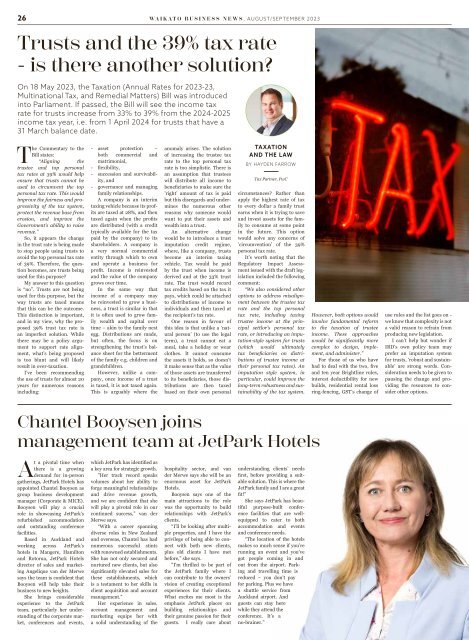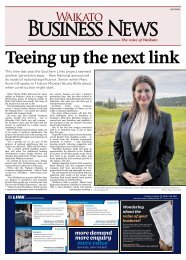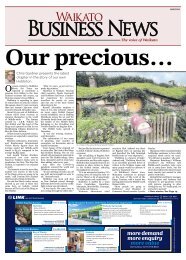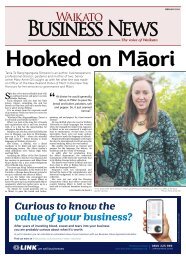Waikato Business News August/September 2023
Waikato Business News has for a quarter of a century been the voice of the region’s business community, a business community with a very real commitment to innovation and an ethos of cooperation.
Waikato Business News has for a quarter of a century been the voice of the region’s business community, a business community with a very real commitment to innovation and an ethos of cooperation.
- No tags were found...
Create successful ePaper yourself
Turn your PDF publications into a flip-book with our unique Google optimized e-Paper software.
26 WAIKATO BUSINESS NEWS, AUGUST/SEPTEMBER <strong>2023</strong><br />
Trusts and the 39% tax rate<br />
- is there another solution?<br />
On 18 May <strong>2023</strong>, the Taxation (Annual Rates for <strong>2023</strong>-23,<br />
Multinational Tax, and Remedial Matters) Bill was introduced<br />
into Parliament. If passed, the Bill will see the income tax<br />
rate for trusts increase from 33% to 39% from the 2024-2025<br />
income tax year, i.e. from 1 April 2024 for trusts that have a<br />
31 March balance date.<br />
The Commentary to the<br />
Bill states:<br />
“Aligning the<br />
trustee and top personal<br />
tax rates at 39% would help<br />
ensure that trusts cannot be<br />
used to circumvent the top<br />
personal tax rate. This would<br />
improve the fairness and progressivity<br />
of the tax system,<br />
protect the revenue base from<br />
erosion, and improve the<br />
Government’s ability to raise<br />
revenue.”<br />
So, it appears the change<br />
in the trust rate is being made<br />
to stop people using trusts to<br />
avoid the top personal tax rate<br />
of 39%. Therefore, the question<br />
becomes, are trusts being<br />
used for this purpose?<br />
My answer to this question<br />
is “no”. Trusts are not being<br />
used for this purpose, but the<br />
way trusts are taxed means<br />
that this can be the outcome.<br />
This distinction is important,<br />
and in my view, why the proposed<br />
39% trust tax rate is<br />
an imperfect solution. While<br />
there may be a policy argument<br />
to support rate alignment,<br />
what’s being proposed<br />
is too blunt and will likely<br />
result in over-taxation.<br />
I’ve been recommending<br />
the use of trusts for almost 20<br />
years for numerous reasons<br />
including:<br />
- asset protection –<br />
both commercial and<br />
matrimonial,<br />
- flexibility,<br />
- succession and survivability,<br />
and<br />
- governance and managing<br />
family relationships.<br />
A company is an interim<br />
taxing vehicle because its profits<br />
are taxed at 28%, and then<br />
taxed again when the profits<br />
are distributed (with a credit<br />
typically available for the tax<br />
paid by the company) to its<br />
shareholders. A company is<br />
a very normal commercial<br />
entity through which to own<br />
and operate a business for<br />
profit. Income is reinvested<br />
and the value of the company<br />
grows over time.<br />
In the same way that<br />
income of a company may<br />
be reinvested to grow a business,<br />
a trust is similar in that<br />
it is often used to grow family<br />
wealth and capital over<br />
time – akin to the family nest<br />
egg. Distributions are made,<br />
but often, the focus is on<br />
strengthening the trust’s balance<br />
sheet for the betterment<br />
of the family e.g. children and<br />
grandchildren.<br />
However, unlike a company,<br />
once income of a trust<br />
is taxed, it is not taxed again.<br />
This is arguably where the<br />
anomaly arises. The solution<br />
of increasing the trustee tax<br />
rate to the top personal tax<br />
rate is too simplistic. There is<br />
an assumption that trustees<br />
will distribute all income to<br />
beneficiaries to make sure the<br />
’right’ amount of tax is paid<br />
but this disregards and undermines<br />
the numerous other<br />
reasons why someone would<br />
want to put their assets and<br />
wealth into a trust.<br />
An alternative change<br />
would be to introduce a trust<br />
imputation credit regime,<br />
where, like a company, trusts<br />
become an interim taxing<br />
vehicle. Tax would be paid<br />
by the trust when income is<br />
derived and at the 33% trust<br />
rate. The trust would record<br />
tax credits based on the tax it<br />
pays, which could be attached<br />
to distributions of income to<br />
individuals and then taxed at<br />
the recipient’s tax rate.<br />
One reason in favour of<br />
this idea is that unlike a ‘natural<br />
person’ (to use the legal<br />
term), a trust cannot eat a<br />
meal, take a holiday or wear<br />
clothes. It cannot consume<br />
the assets it holds, so doesn’t<br />
it make sense that as the value<br />
of those assets are transferred<br />
to its beneficiaries, those distributions<br />
are then taxed<br />
based on their own personal<br />
TAXATION<br />
AND THE LAW<br />
BY HAYDEN FARROW<br />
Tax Partner, PwC<br />
circumstances? Rather than<br />
apply the highest rate of tax<br />
to every dollar a family trust<br />
earns when it is trying to save<br />
and invest assets for the family<br />
to consume at some point<br />
in the future. This option<br />
would solve any concerns of<br />
’circumvention’ of the 39%<br />
personal tax rate.<br />
It’s worth noting that the<br />
Regulatory Impact Assessment<br />
issued with the draft legislation<br />
included the following<br />
comment:<br />
“We also considered other<br />
options to address misalignment<br />
between the trustee tax<br />
rate and the top personal<br />
tax rate, including taxing<br />
trustee income at the principal<br />
settlor’s personal tax<br />
rate, or introducing an imputation-style<br />
system for trusts<br />
(which would ultimately<br />
tax beneficiaries on distributions<br />
of trustee income at<br />
their personal tax rates). An<br />
imputation style system, in<br />
particular, could improve the<br />
long-term robustness and sustainability<br />
of the tax system.<br />
However, both options would<br />
involve fundamental reform<br />
to the taxation of trustee<br />
income. These approaches<br />
would be significantly more<br />
complex to design, implement,<br />
and administer.”<br />
For those of us who have<br />
had to deal with the two, five<br />
and ten year Brightline rules,<br />
interest deductibility for new<br />
builds, residential rental loss<br />
ring-fencing, GST’s change of<br />
use rules and the list goes on -<br />
we know that complexity is not<br />
a valid reason to refrain from<br />
producing new legislation.<br />
I can’t help but wonder if<br />
IRD’s own policy team may<br />
prefer an imputation system<br />
for trusts, ‘robust and sustainable’<br />
are strong words. Consideration<br />
needs to be given to<br />
pausing the change and providing<br />
the resources to consider<br />
other options.<br />
Chantel Booysen joins<br />
management team at JetPark Hotels<br />
At a pivotal time when<br />
there is a growing<br />
demand for in-person<br />
gatherings, JetPark Hotels has<br />
appointed Chantel Booysen as<br />
group business development<br />
manager (Corporate & MICE).<br />
Booysen will play a crucial<br />
role in showcasing JetPark's<br />
refurbished accommodation<br />
and outstanding conference<br />
facilities.<br />
Based in Auckland and<br />
working across JetPark’s<br />
hotels in Mangere, Hamilton<br />
and Rotorua, JetPark Hotels<br />
director of sales and marketing<br />
Angelique van der Merwe<br />
says the team is confident that<br />
Booysen will help take their<br />
business to new heights.<br />
She brings considerable<br />
experience to the JetPark<br />
team, particularly her understanding<br />
of the corporate market,<br />
conferences and events,<br />
which JetPark has identified as<br />
a key area for strategic growth.<br />
"Her track record speaks<br />
volumes about her ability to<br />
forge meaningful relationships<br />
and drive revenue growth,<br />
and we are confident that she<br />
will play a pivotal role in our<br />
continued success,” van der<br />
Merwe says.<br />
“With a career spanning<br />
diverse roles in New Zealand<br />
and overseas, Chantel has had<br />
numerous successful stints<br />
with renowned establishments.<br />
She has not only secured and<br />
nurtured new clients, but also<br />
significantly elevated sales for<br />
these establishments, which<br />
is a testament to her skills in<br />
client acquisition and account<br />
management.”<br />
Her experience in sales,<br />
account management and<br />
marketing equips her with<br />
a solid understanding of the<br />
hospitality sector, and van<br />
der Merwe says she will be an<br />
enormous asset for JetPark<br />
Hotels.<br />
Booysen says one of the<br />
main attractions to the role<br />
was the opportunity to build<br />
relationships with JetPark’s<br />
clients.<br />
“I’ll be looking after multiple<br />
properties, and I have the<br />
privilege of being able to connect<br />
with both new clients,<br />
plus old clients I have met<br />
before,” she says.<br />
"I'm thrilled to be part of<br />
the JetPark family where I<br />
can contribute to the owners’<br />
vision of creating exceptional<br />
experiences for their clients.<br />
What excites me most is the<br />
emphasis JetPark places on<br />
building relationships and<br />
their genuine passion for their<br />
guests. I really care about<br />
understanding clients’ needs<br />
first, before providing a suitable<br />
solution. This is where the<br />
JetPark family and I are a great<br />
fit!”<br />
She says JetPark has beautiful<br />
purpose-built conference<br />
facilities that are wellequipped<br />
to cater to both<br />
accommodation and events<br />
and conference needs.<br />
“The location of the hotels<br />
makes so much sense if you’re<br />
running an event and you’ve<br />
got people coming in and<br />
out from the airport. Parking<br />
and travelling time is<br />
reduced – you don’t pay<br />
for parking. Plus we have<br />
a shuttle service from<br />
Auckland airport. And<br />
guests can stay here<br />
while they attend the<br />
conference. It’s a<br />
no-brainer.”

















